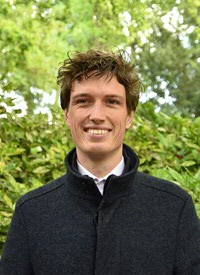‘Sex education in the Netherlands is too one-sided’

In the Netherlands, religion and sexuality are often considered to be incompatible. PhD student Jelle Wiering is contesting the tendency to consider religion to be a source of problems when it comes to sexuality. He studied secular practices in the Dutch field of sexual health. His methods included participant observation, which meant that he also trained to teach sex education. Wiering asserts that many of the issues that are put down to the religious approach to sexuality conceal the fact that there are similar problems relating to sexuality in non-religious contexts. Jelle Wiering will be awarded a PhD by the University of Groningen on 8 September.
Wiering is critical of the way that sex education is currently given in the Netherlands. ‘Open conversations about sexuality are usually anything but open, and are actually intended to promote views of sex that are upheld by the majority, thereby putting anyone who thinks differently in a negative spotlight. The dynamics in these conversations serve to highlight the underlying differences. It is generally assumed that it is good to talk about sex, and to be open about it. I think that we need to realize that this is a normative assumption, and that we tend to label people who think differently as prudish and/or old-fashioned.’
Girls lead the way
Sex education includes implicit moral messages about how boys and girls should deal with sex, says Wiering. Girls are given responsibility for thinking about sex, for setting boundaries for sexual behaviour and for communicating them clearly. Boys, in contrast, are encouraged to play a passive role, to listen, and to be able to observe the exact details of the protocols that are being communicated. According to Wiering, this division of roles is problematic: it has the unwanted effect that many men have trouble talking about sexuality and that it is easier for them to avoid taking responsibility for their own sexual behaviour.
Dokter Corrie
Wiering also examined the school television programme ‘Dokter Corrie’. An analysis of the complaints received about the programme, mainly from religious people, showed that although many of them were not opposed to sex education, they objected to the normalization of sexuality as promoted by the show. Wiering also analysed an episode of the programme ‘Hotel Sophie’, which claims to discuss sexuality as an ordinary subject. He showed that the conversations featured in this episode were predominantly aimed at people whose ideas about sexuality deviate from mainstream opinions. He therefore asserts that normalizing sexuality suggests the existence of (and even widens) a gap between white, non-religious Dutch people and religious, non-white others.

Rutgers is a determining factor
The Dutch sexual and reproductive health and rights (SRHR) organization Rutgers plays an important role in the world of sex education. ‘Rutgers has a lot of influence on potential future funding, and is both a centre of expertise and an important party in the market for the services and products relating to sexual health. This means that independent parties, such as sexology consultants, feel the need to maintain good relations with Rutgers.’ A huge majority of the people that Wiering spoke to during the course of his research were extremely happy with the work being carried out by Rutgers, which is an important finding. However, they also think that the organization is dominating the field. In the Netherlands, sex often connotes Rutgers, and Wiering thinks that this is something that we should be aware of. According to his contacts, it can be difficult to get new initiatives in the field of sexual health off the ground because of the financial structures that are currently in place and the powerful position of large-scale organizations such as Rutgers.
Religion should not be a scapegoat
Wiering claims that problems concerning sexuality are often linked to religion, and this is not helping. ‘We tend not to scrutinize behaviour and standards that are dictated by non-religious beliefs, which is a pity. Important, positive steps are being made in the field of Dutch sex education, but we must be aware of the assumptions that are being communicated in our lessons. How does the information that we give to boys about sex differ from that given to girls, and is this really what we want? Can you really make a class discussion about sex feel safe? Do we really think that we should be able to talk about sex when and wherever we want? Or is it important to think about who we talk to, and where? These are essential questions that are not being asked because of our obsessive focus on religion and the association with prudishness.’
More information
Jelle Wiering
| Last modified: | 07 December 2020 1.36 p.m. |
More news
-
05 March 2025
Women in Science
The UG celebrates International Women’s Day with a special photo series: Women in Science.
-
10 February 2025
Project GRACE: An ENLIGHT ETN Grant Winner
We are happy to announce that the project GRACE, with Julia Martínez-Ariño as the main coordinator, is one of the projects selected for the ENLIGHT 2024 Call. Congratulations to the GRACE team.
